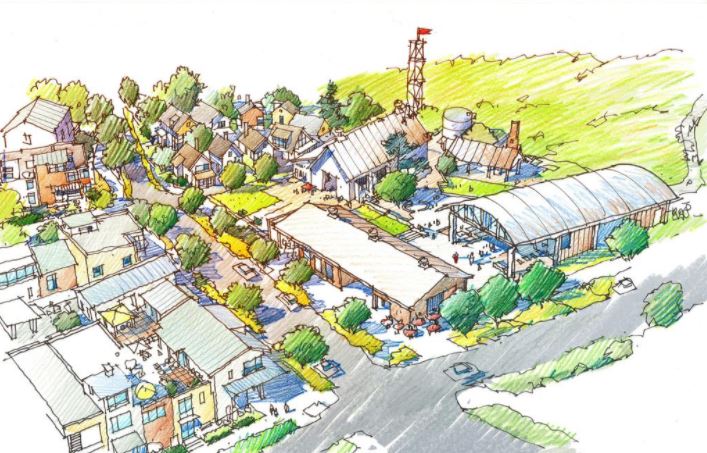Zoning laws, racist deed restrictions and government initiatives like urban renewal in Charlotte’s history helped create segregated neighborhoods, which can be seen vividly in the geographic “crescent” and “wedge” shapes in maps of household incomes and other metrics in the city.
Meanwhile, companies and leaders in the private sector who have significant influence on a city’s built environment typically lack the diversity of the communities where they work. A frequently cited Commercial Real Estate Diversity Report from 2013 found white men held the majority of commercial real estate jobs in four out of five job categories and 77.6% of senior executive roles.
Although that study is seven years old now, much of what it found — an overall lack of diversity in commercial real estate as well as barriers for minority men and women to advance in the industry — remains true today. At most commercial real estate firms in Charlotte, decision-makers are overwhelmingly white and male.
Charlotte-based Little Diversified Architectural Consulting hosted a virtual panel Thursday afternoon, moderated by company chairman John Komisin, to discuss the role land planning and development have on creating equal opportunity and upward mobility.
Todd Mansfield, CEO of Charlotte development firm Crescent Communities, said the company has, in the past few months, stepped up its diversity and inclusion initiatives. The firm’s leadership team is meeting regularly to discuss what more can be done.
He said Crescent will be changing its approach to recruitment, including what universities the firm goes to for internships and hiring. At Little, Komisin said each of its offices targets a local historically Black college or university for recruitment.
“We’re doing a lot of listening and learning because we have a lot to learn,” Mansfield said.
At River District, one of Crescent’s significant upcoming projects on the far west side of Charlotte, the planned first phase will include residential development, with affordable units among them. The firm has also been hosting seminars to reach a wider pool of businesses for contracts in the project.
“Our goal is to include firms that aren’t regularly at the table for commercial construction,” Mansfield said.
Separately, Crescent is developing an apartment prototype that would enable “meaningfully lower” rents. Mansfield said the company is working on design and operational studies now and, assuming costs work out, could have the first of that type of community under construction next year.
Ronn Stewart, senior vice president at local mixed-income developer Laurel Street Residential, said the company has numerous goals around workforce development and recruitment. Laurel Street specifically targets women- and minority-owned businesses for subcontractor work, even if it means having to structure bid packages differently so that smaller firms have a chance to qualify for even a portion of a job.
Despite mandates in local government and elsewhere to award a certain percentage of contract work to minority- and women-owned businesses, there remains a lack of diverse ownership and capitalization in real estate developments.
“Being in real estate development is a highly capital intensive profession and there’s not a lot of minorities in this field,” Stewart said.
Owning real estate — residential or commercial — is one of the most significant ways to build wealth and obtain financial stability, he continued.
City leaders say there’s a role both land planning and economic development can play in upward mobility and equity.
“History has a way of repeating itself unless, of course, we do something about it,” said Taiwo Jaiyeoba, assistant city manager and planning director. “There’s been a lot in our city that’s been prosperous and successful — most Black and brown residents have not (enjoyed that).”
His department is spearheading two major initiatives, the 2040 comprehensive vision plan and the unified development ordinance. Both documents have somewhat different objectives but are intended to create a vision for Charlotte’s future and build policy and zoning regulations to support those principles.
The 2040 plan has been in the works for some time but, Jaiyeoba said, it’s been important to get as much resident feedback and engagement as possible.
“We have to challenge our land-use planning policies and zoning recommendations,” Jaiyeoba said. He’s been thinking lately about equitable development initiatives that could help build the capacity of minority developers and create an inclusive growth strategy.
Jaiyeoba has talked previously about the need for more housing diversity throughout Charlotte. Many areas around the city were historically zoned to exclusively allow single-family residential development, meaning more dense, affordable options like duplexes or quads aren’t developed in those areas.
On recruitment and expansion, Tracy Dodson, assistant city manager who leads economic development, said her department has become more intentional about finding out how companies will contribute to the local community, such as workforce development, hiring for a broad range of job types and positions, and specific commitments to upward mobility.
Dodson referenced Centene Corp., the Fortune 100 adding thousands of jobs here in a new East Coast headquarters in University Research Park. She said 1,000-plus of those new jobs will be local hires at a somewhat entry level, and noted the company’s planned job-training center on site.
“Creating a city that’s equitable, livable and connected is critical in job development,” Dodson said.

